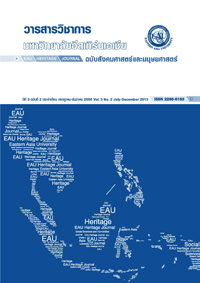การพัฒนาหลักสูตรการเป็นพลเมืองดีสำหรับเยาวชน
Keywords:
การพัฒนาหลักสูตรฝึกอบรม, หลักสูตรฝึกอบรม, ความเป็นพลเมืองดี, เยาวชน, development of training program, training program, good citizen, youthAbstract
การวิจัยเชิงทดลองนี้ มีวัตถุประสงค์เพื่อ (1)พัฒนาหลักสูตรฝึกอบรมการเป็นพลเมืองดี สำหรับเยาวชน และ (2) ตรวจสอบประสิทธิภาพของหลักสูตรฝึกอบรมการเป็นพลเมืองดี สำหรับเยาวชน โดยกลุ่มตัวอย่าง ที่ใช้ทดลองหลักสูตรฝึกอบรม คือ นักเรียนที่กำลังศึกษาชั้นมัธยมศึกษาปีที่ 3 โรงเรียนปราจิณราษฎรอำรุง อำเภอเมือง จังหวัดปราจีนบุรี แบ่งเป็น นักเรียนที่เป็นกลุ่มทดลองจำนวน 30 คนและ นักเรียนที่เป็นกลุ่มควบคุม จำนวน 30 คน โดยมีวิธีการดำเนินการวิจัยดังนี้ ตอนที่ 1 การศึกษาและวิเคราะห์ข้อมูลพื้นฐาน เป็นการศึกษา และวิเคราะห์หลักการพัฒนาหลักสูตรฝึกอบรมการเป็นพลเมืองดี สำหรับเยาวชน โดยเริ่มจากการศึกษาแนวคิด ทฤษฎี ผลงาน วิจัยที่เกี่ยวข้อง แล้วนำมาวิเคราะห์ สังเคราะห์ กำหนดเป็นกรอบแนวคิด จากนั้นกำหนดกลุ่ม ตัวอย่างที่ใช้ในการวิจัย ตอนที่ 2 การสร้างหลักสูตรฝึกอบรม ประกอบด้วยหลักการและเหตุผล แนวคิดพื้นฐาน ในการพัฒนาหลักสูตรฝึกอบรม และโครงสร้างต่าง ๆ ที่สำคัญ ตอนที่ 3 การตรวจสอบประสิทธิภาพของหลักสูตร ฝึกอบรมโดยใช้แบบแผนการทดลองแบบ nonequivalent pretest-posttest control-group design ใช้สถิติ t-test แล้วนำเสนอผลการทดสอบในรูปตาราง สำหรับกลุ่มทดลองมีการประเมินผลการฝึกอบรม ตอนที่ 4 การปรับปรุง หลักสูตรฝึกอบรม หลังจากได้ตรวจสอบประสิทธิภาพแล้ว ได้นำผลมาปรับปรุงแก้ไข ผลการวิจัยพบว่า หลักสูตรนี้ สร้างขึ้นเพื่อพัฒนาคุณลักษณะความเป็นพลเมืองดีของเยาวชนใน 6 ด้าน คือ ด้านความรับผิดชอบ ด้านคุณลักษณะ ประชาธิปไตย ด้านการมีคุณธรรม ด้านการมีวินัยในตนเอง ด้านความสามารถในการปรับตัวและด้านความ เป็นไทย
The Development of Training Programs For Good Youth Citizens
This research aimed to 1) Develop the curriculum of good citizen for youth; 2) Evaluate the effectiveness of the curriculum of good citizen for youth. According to several research and development models, the curriculum was developed through 4 stages as follows : stage 1: surveying fundamental data; the researcher collected data from printed materials, related literature. By collected data from the learners, social environment, cultural, nature and learners qualification. Stage 2: Constructing a Training Curriculum. a curriculum was created based on the fundamental data including principle and rationale, fundamental concepts, objectives and structure. The curriculum contains six training units. Stage 3: Evaluating the Effectiveness of the Curriculum; the study applied to nonequivalent pretest-posttest control-group design. The thirty of experimental group was trained with the improved curriculum to refine the effectiveness of the curriculum in the aspect of content validity relation. From the result of the experiment, the sample group can pass the test at the end of sub-unit, more than 80%. Relating with the mentioned as above. Stage 4: Revising the Curriculum; In the experimental process, and after the experiment, each learning unit was evaluated by the trainees concerning the suitability of the objectives, content, training methods and activities, and training media. The study depicted that the curriculum appeared appropriate in all aspects.




